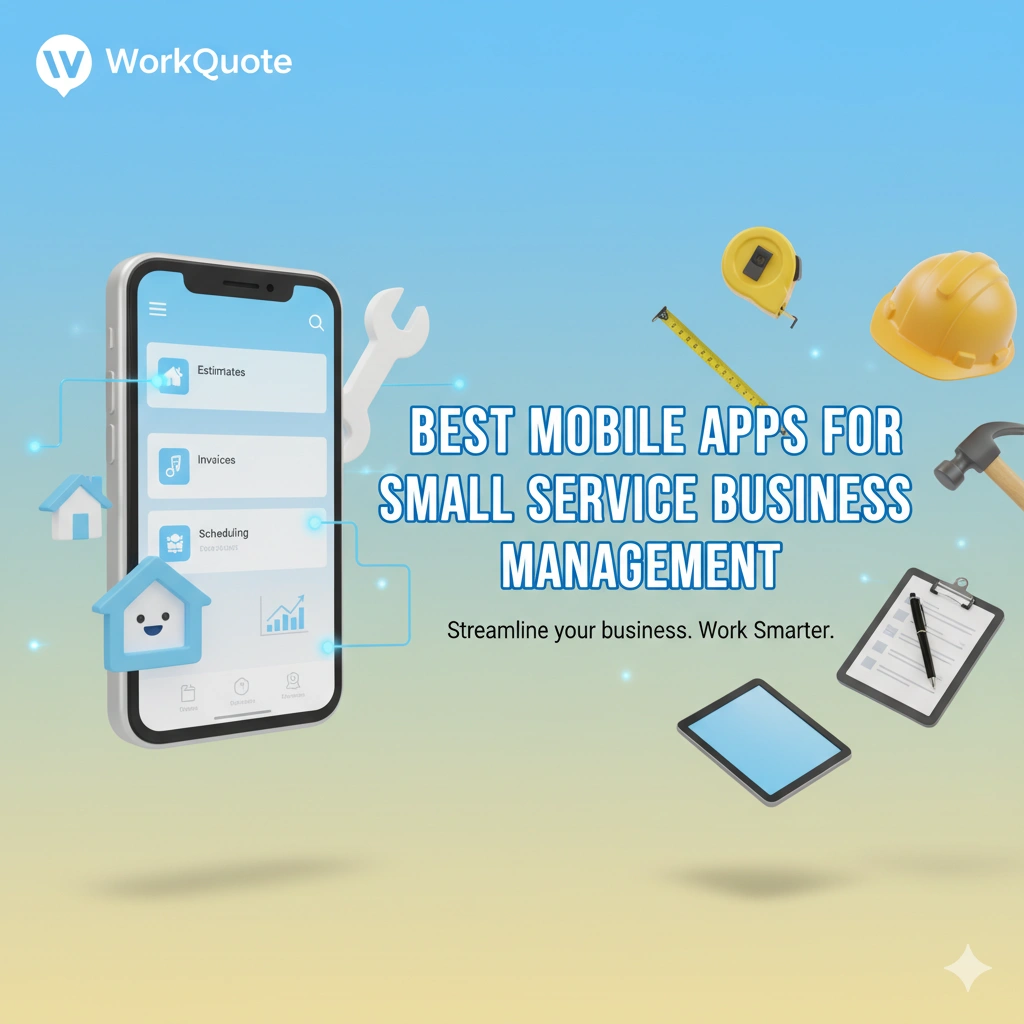
Discover the top mobile applications that help small service businesses streamline operations, manage clients, and boost productivity. From scheduling to invoicing, these apps transform how service professionals run their businesses on the go.
Why Mobile Apps Are Essential for Service Businesses
Small service businesses face unique challenges that require flexible, mobile solutions. Whether you're a freelance photographer rushing between shoots, an HVAC technician moving from job to job, or a lawn care professional managing multiple properties, having the right mobile tools can make or break your business efficiency.
Mobile apps designed for service businesses offer several key advantages over traditional desktop software. They provide real-time access to customer information, enable on-site estimate creation, allow instant communication with clients, and keep all business data synchronized across devices. This mobility translates directly into improved customer service, faster response times, and ultimately, increased revenue.
The modern service business owner needs tools that work as hard as they do. Mobile apps eliminate the need to return to the office for basic tasks like creating invoices, checking schedules, or updating customer records. This efficiency gain allows business owners to focus more time on actual service delivery and customer relationships.
Core Features Every Service Business App Should Have
When evaluating mobile apps for your service business, certain features are non-negotiable. These core capabilities form the foundation of effective business management and should be present in any app you consider.
Customer Relationship Management
A robust customer database is the heart of any service business. Your mobile app should store detailed client information, service history, preferences, and contact details. This information should be easily searchable and accessible even when you're offline. The ability to add notes about specific customer requirements or property details can significantly improve service quality.
Integration with your phone's contact system and the ability to quickly call or text customers directly from the app streamlines communication. Some apps also offer customer portal features, allowing clients to view their service history, upcoming appointments, and invoices.
Scheduling and Calendar Management
Effective scheduling tools prevent double-bookings, optimize route planning, and ensure efficient use of time. Look for apps that offer drag-and-drop scheduling, recurring appointment setup, and automatic reminder systems. The calendar should sync with your personal calendar apps and provide different views for daily, weekly, and monthly planning.
Advanced scheduling features include travel time calculations, technician assignment for multi-person businesses, and integration with mapping applications for route optimization. Some apps also offer customer self-scheduling capabilities through online booking portals.
Estimate and Quote Creation
The ability to create professional estimates on-site is crucial for service businesses. Your app should offer customizable templates, item libraries for common services, and the flexibility to add photos and detailed descriptions. Digital signatures eliminate the need for paper contracts and speed up the approval process.
Pricing flexibility is important, with options for flat rates, hourly billing, and material markups. The app should calculate taxes automatically and provide multiple estimate versions when needed. Integration with your service catalog ensures consistent pricing across all jobs.
Invoicing and Payment Processing
Seamless invoicing capabilities reduce the time between job completion and payment. Look for apps that can convert estimates directly into invoices, apply partial payments, and track payment status. Mobile payment processing allows you to collect payment immediately upon job completion, improving cash flow significantly.
Automated invoice delivery via email or text, along with payment reminders for overdue accounts, reduces administrative overhead. Integration with accounting software ensures accurate financial record-keeping without duplicate data entry.
Top Mobile Apps for Different Service Business Types
Different service industries have varying needs, and some apps cater specifically to certain business types. Understanding which apps work best for your industry can help narrow down your options.
Field Service Management Apps
For businesses with technicians in the field, comprehensive field service management apps provide end-to-end solutions. These apps typically include work order management, inventory tracking, GPS tracking, and detailed reporting capabilities.
ServiceTitan leads the market for larger service businesses, offering robust features for HVAC, plumbing, and electrical companies. The mobile app provides technicians with complete job information, customer history, and the ability to upsell additional services. However, the complexity and cost make it less suitable for very small businesses.
Housecall Pro targets smaller service businesses with a more streamlined approach. The app includes scheduling, invoicing, payment processing, and customer communication tools. Its user-friendly interface makes it accessible for business owners who aren't tech-savvy, while still providing powerful automation features.
All-in-One Business Management Solutions
Some apps attempt to cover all aspects of service business management in a single platform. These solutions work well for solo professionals and small teams who need comprehensive functionality without managing multiple software systems.
WorkQuote exemplifies this approach, combining estimate creation, job scheduling, invoicing, and financial tracking in one mobile-first platform. The app's strength lies in its simplicity and focus on the core needs of small service businesses. Features like custom estimates, automated invoicing, and expense tracking cover the essential business functions without overwhelming complexity.
The app's industry flexibility makes it suitable for diverse service businesses, from lawn care to photography. The free trial allows business owners to test functionality before committing, and the mobile-optimized design ensures smooth operation on both phones and tablets.
Specialized Industry Apps
Certain industries benefit from apps designed specifically for their unique requirements. These specialized solutions often provide deeper functionality in specific areas while maintaining general business management capabilities.
For landscaping and lawn care businesses, apps like LawnPro Software offer features like property mapping, seasonal service scheduling, and weather integration. Photography businesses might prefer apps with portfolio management, client galleries, and contract templates specific to creative services.
Construction and contracting businesses often need apps with project management capabilities, material ordering, and compliance tracking. These specialized features justify choosing an industry-specific app over a general business management solution.
Essential Features for Mobile Optimization
The mobile nature of service businesses demands apps that work seamlessly on smartphones and tablets. Several features are crucial for effective mobile operation.
Offline Functionality
Service professionals often work in areas with poor cellular coverage or need to access information quickly without waiting for data to load. Apps with robust offline capabilities store essential data locally and sync changes when connectivity returns.
Critical offline features include customer information, service history, pricing catalogs, and the ability to create estimates and invoices. Photos and documents should also be accessible offline, with automatic upload when connection is restored.
Photo and Document Management
Visual documentation is increasingly important for service businesses. Apps should allow easy photo capture, annotation, and attachment to customer records or work orders. Before-and-after photos help demonstrate value to customers and provide protection against disputes.
Document storage capabilities should include contracts, permits, warranties, and other important paperwork. Cloud synchronization ensures documents are accessible from any device while maintaining security and backup protection.
GPS and Mapping Integration
Location-based features enhance efficiency and customer service. GPS integration should provide accurate job site locations, route optimization for multiple appointments, and mileage tracking for expense purposes.
Geofencing capabilities can automatically check technicians in and out of job sites, while location sharing keeps customers informed about arrival times. Integration with popular mapping apps ensures seamless navigation without switching between applications.
Integration and Compatibility Considerations
Modern service businesses use multiple tools and platforms, making integration capabilities crucial when selecting a mobile app. Your chosen solution should work well with existing systems and popular business tools.
Accounting Software Integration
Seamless integration with accounting platforms like QuickBooks eliminates duplicate data entry and ensures accurate financial records. Look for apps that can sync customer information, invoices, payments, and expenses automatically.
This integration becomes particularly important during tax season or when working with accountants. Having all financial data properly categorized and synchronized saves significant time and reduces errors in financial reporting.
Communication Platform Integration
Integration with email, text messaging, and customer communication platforms streamlines client interactions. Apps should be able to send automated appointment reminders, invoice notifications, and follow-up messages through multiple channels.
Some apps integrate with popular communication tools like Slack or Microsoft Teams for internal team coordination. This integration keeps all business communication centralized and accessible from the mobile app.
Marketing and CRM Integration
For businesses focused on growth, integration with marketing platforms and customer relationship management systems provides valuable insights and automation opportunities. Customer data from service interactions can inform marketing campaigns and help identify upselling opportunities.
Email marketing integration allows automatic addition of customers to mailing lists, while review management integration helps encourage satisfied customers to leave positive reviews on relevant platforms.
Security and Data Protection
Service businesses handle sensitive customer information, making security a critical consideration when choosing mobile apps. Understanding security features and best practices protects both your business and your customers.
Data Encryption and Storage
All customer data should be encrypted both in transit and at rest. Look for apps that use industry-standard encryption protocols and store data in secure, compliant data centers. Regular security audits and certifications provide additional assurance of data protection.
Cloud storage should include automatic backups and disaster recovery capabilities. This protection ensures business continuity even if devices are lost, stolen, or damaged.
User Access Controls
For businesses with multiple users, role-based access controls ensure employees can only access information necessary for their responsibilities. This limitation reduces security risks while maintaining operational efficiency.
Features like user activity logging and permission management provide oversight of who accesses what information and when. These controls are particularly important for businesses handling sensitive customer data or financial information.
Cost Considerations and ROI
While cost is always a factor in business decisions, focusing solely on price can lead to poor choices. Understanding the total cost of ownership and potential return on investment helps make informed decisions about mobile app investments.
Pricing Models
Service business apps typically use subscription pricing models with monthly or annual payment options. Pricing often scales with the number of users, customers, or features included. Some apps offer tiered pricing with basic, professional, and enterprise levels.
Consider not just the monthly cost, but also setup fees, training costs, and potential integration expenses. Free trials allow testing of functionality before committing to paid plans, making them valuable for evaluation purposes.
Calculating Return on Investment
The right mobile app can provide significant returns through improved efficiency, faster payment collection, and reduced administrative overhead. Calculate potential savings from reduced paperwork, faster invoicing, and improved scheduling efficiency.
Customer satisfaction improvements from better communication and professional presentation can lead to increased referrals and repeat business. These indirect benefits often exceed the direct cost savings from operational efficiency.
Implementation and Training
Successfully adopting a new mobile app requires proper implementation planning and user training. Even the best app will fail if users don't understand how to use it effectively.
Data Migration
Moving existing customer data, service history, and financial information to a new app can be challenging. Look for apps that offer data import tools or migration services. Clean, accurate data migration is crucial for maintaining business continuity during the transition.
Plan for a transition period where both old and new systems may need to operate simultaneously. This overlap ensures no customer information or appointments are lost during the changeover.
User Training and Adoption
Comprehensive training ensures all team members can use the app effectively. Look for apps that provide training resources, video tutorials, and responsive customer support. Some vendors offer personalized training sessions or implementation consulting.
Start with basic features and gradually introduce advanced functionality as users become comfortable. This phased approach reduces overwhelm and improves long-term adoption rates.
Future-Proofing Your Choice
Technology evolves rapidly, and your chosen app should be able to grow with your business and adapt to changing needs. Consider the vendor's track record of updates and new feature development.
Scalability
Your app should accommodate business growth without requiring a complete system change. Look for solutions that can handle increased customer volumes, additional users, and expanded service offerings without performance degradation.
Consider whether the app can support multiple locations, franchises, or business divisions if your growth plans include expansion. Scalability in pricing models ensures costs remain reasonable as your business grows.
Technology Trends
Emerging technologies like artificial intelligence, machine learning, and automation are increasingly important in business management apps. Choose vendors that invest in innovation and regularly update their platforms with new capabilities.
Integration with emerging technologies like IoT devices, voice assistants, and augmented reality may become important for certain service industries. A forward-thinking vendor is more likely to support these integrations as they become mainstream.
Making the Final Decision
Selecting the right mobile app for your service business requires careful evaluation of your specific needs, budget constraints, and growth plans. Take advantage of free trials to test functionality with real business scenarios before making a commitment.
Consider creating a checklist of must-have features, nice-to-have capabilities, and deal-breakers. This systematic approach helps compare options objectively and ensures important requirements aren't overlooked in favor of flashy but unnecessary features.
Remember that the best app is the one your team will actually use consistently. A simple app that gets used daily is more valuable than a feature-rich solution that sits unused due to complexity or poor user experience.
The investment in the right mobile app pays dividends through improved efficiency, better customer service, and business growth. Take the time to choose wisely, and your service business will benefit from streamlined operations and enhanced professionalism for years to come.

